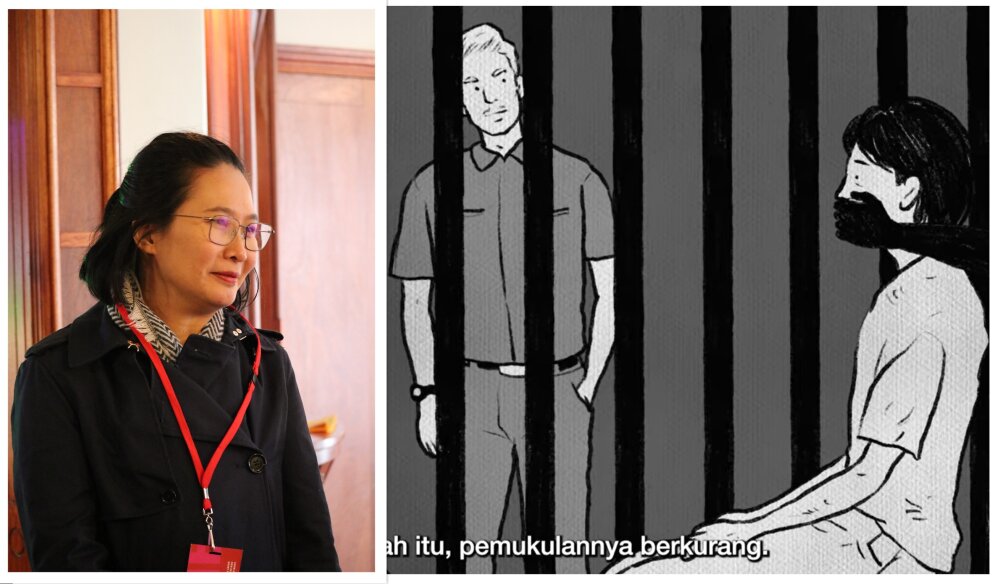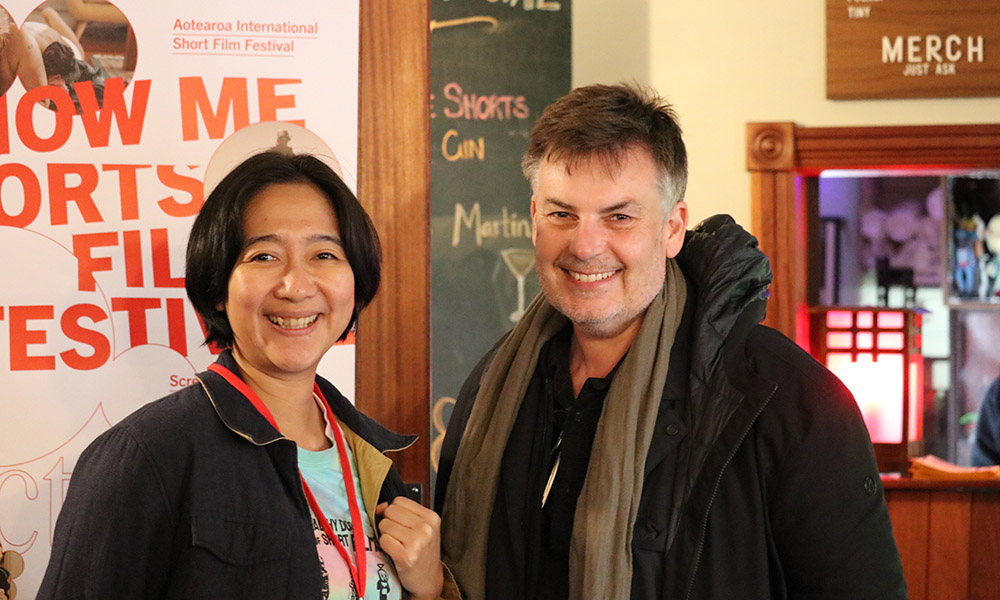
Amelia Hapsari and still from her film, Acung Memilih Bersuara
Among the seven short films presented in Hollywood Avondale, Auckland on October 6 was Acung Memilih Bersuara (Acung Decides to Speak Up).
This monochrome animated feature was the brainchild of Amelia Hapsari, serving its narrator, writer, and director.
In a conversation with the Asia Media Centre, Hapsari delved into her motivations for the 11-minute piece. Her film throws light on the harrowing tale of Acung, a former political prisoner of Chinese-Indonesian descent.
Hapsari, a former radio journalist, met Acung during the 2008 Beijing Olympics and conducted an interview with him. Over the course of time, Acung's narrative profoundly impacted her, and she resolved to relay his story in order to ensure that the challenges encountered by the Chinese ethnic community in Indonesia were not forgotten by the younger generation.
“I was trying to get a documentary made, things like that, but it was very difficult at that time. Until in 2021, there was a foundation, and they wanted to create some stories of human rights violations done by the state in order to, basically, educate Indonesian youths of these incidents in the past… It is important for young people to know our history – it’s painful,” Hapsari said.
In the film, Acung, throughout his life, faced discrimination in Indonesia, mainly due to his Chinese heritage.
Being in a predominantly Islamic nation, he was often targeted and taunted as a "pork eater." Early on, he grappled with understanding why societal norms treated his family differently. Questioning his parents only led to the realisation that their minority status meant they had to accept the inherent discrimination.
By 1958, amidst a policy push by the Indonesian government, Acung's family had opted for Indonesian citizenship over their Chinese roots. But this choice was not synonymous with acceptance or inclusion.
In 1965, in the Cold War era, rife with anti-communism sentiments, saw the Chinese community in Indonesia bear the brunt. Their businesses were not just looted by locals but outright seized.
Choosing to resist this repression, Acung found himself imprisoned, enduring torture and incarceration for years without any trial. His tale mirrors the hardships faced by countless Chinese-Indonesians during that period.
In contemporary Indonesia, Hapsari, who self-identifies as a Chinese-Indonesian, acknowledges the enduring presence of prejudiced sentiments. She explains that this is precisely why she was determined in her mission to share Acung story with the world as she stressed, "this is not just about 1965.”
She also draws inspiration from her personal experience: "I grew up in the Suharto era, during that period it was very emphasised that the Chinese-Indonesians were there just to exploit the country. They were merchants, they just care about the money etc. So, I grew up with this kind of image, and it was difficult because I wanted to prove myself because I am Indonesian, and I am not like that, I love this country. Still, there are people who perceives me differently. “
“So, discovering Acung was discovering an Indonesia where Chinese-Indonesians were actively in politics, and that’s why it struck me because all of these prejudices put upon us were actually a manufactured frame. That’s why I want to tell the story, I want to break this kind of misconception about Chinese-Indonesians,” Hapsari continued.
As a filmmaker, Hapsari is hopeful that the audience will find inspiration to be like Acung and value the importance of speaking up.

Programme director of Minikino, Fransiska Prihadi and Asia New Zealand Foundation's arts director Craig Cooper
Spotlight on Indonesia
Beyond tales of suppression, the Show Me Shorts Film Festival also delved into themes like gender equality, environmental conservation, and the continuing challenges faced by the LGBTQ+ community in Indonesia.
Indonesian creators bravely harnessed their artistry to address societal taboos in their homeland.
Emphasising on the significance of Indonesian cinema, festival director Gina Dellabarca remarked, "Indonesia’s cinema reflects Indonesia itself: a rich melting pot of cultures, languages, and world views. I observe their cinema to contain a frenetic energy that makes for enjoyable cinema experiences. Their filmmakers utilise a level of innovation on a show-string budget, that allows them to craft stories that might seem too ambitious on the page.”
The festival received support not just from the Embassy of the Republic of Indonesia but also from various entities in Aotearoa, including the Asia New Zealand Foundation Te Whītau Tūhono.
Craig Cooper, the Foundation's Arts Director, posited that highlighting Indonesia serves a dual purpose: it offers a platform for Indonesian artists to exhibit their craftsmanship and allows New Zealanders a window into the rich tapestry of Southeast Asian arts.
“The big part of the focus of the arts programme is to make Asia part of the mainstream of New Zealand culture and art, and so this is an opportunity to engage with a part of Asia that it’s often a little bit more challenging to engage with and that is Southeast Asia, particularly, Indonesia,” he said.
Southeast Asia's rising influence is undeniably felt in Asia-Pacific, even in Aotearoa. However, the rich artistic creations from this region often remain underrepresented in the country. From dialogues within New Zealand's artistic circles, Cooper identified film as a standout medium in Southeast Asia.
Bringing attention to the surge in technological development, he made the following observation: "Now that creating a film is as accessible as using your phone, there's a compelling evolution unfolding in Southeast Asia. A noticeable influx of young talents seems to be gravitating towards filmmaking."
Thanks to the popularity of movies, people in New Zealand can experience stories from all over the world at events like the Show Me Shorts Film festival.
Check out this website for information on where to see all the films, including the 13 short films from Indonesia, curated in collaboration with Minikino Short Film Week.
This event runs from 6th to 30th of October 2023.
This article was first published on the Foundation's Asia Media Centre
The Foundation's arts programme aims to bring Asia into the mainstream of New Zealand arts by inspiring New Zealand arts professionals to grow their connections and knowledge of Asia. It also supports the presentation of Asian arts in partnership with New Zealand arts organisations and events.
Our Arts Project Fund supports New Zealand professional arts companies, events and organisations to deliver projects that will grow New Zealanders' awareness and knowledge of Asian arts.


